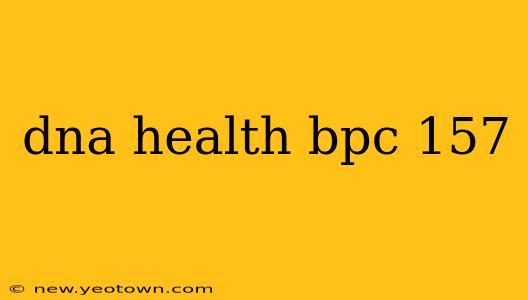For years, the whispers about BPC-157 have echoed through the health and wellness communities. This small peptide, a fragment of body protein, promises remarkable healing properties, sparking intense curiosity and research. But what exactly is BPC-157, and how does it relate to our DNA and overall health? Let's unravel the mystery, exploring both the science and the potential.
What is BPC-157?
Imagine a tiny, powerful messenger in your body, tirelessly working to repair damaged tissues. That's essentially what BPC-157 is. Discovered in the late 1990s, this pentadecapeptide (a chain of 15 amino acids) is a stable fragment of a larger protein found naturally in the human body. Its remarkable ability to accelerate healing has captivated scientists and patients alike. While further research is ongoing, studies suggest it works by influencing various cellular processes, promoting the growth of new blood vessels (angiogenesis), reducing inflammation, and stimulating cell regeneration. It's not a miracle cure, but its potential applications are extensive.
How Does BPC-157 Work at a Cellular Level?
BPC-157's mechanism of action is complex and still being investigated. However, research suggests it interacts with various cellular receptors and signaling pathways, promoting a cascade of healing responses. It doesn't directly replace damaged tissue; instead, it acts as a catalyst, boosting the body's natural repair mechanisms. This means it may help accelerate the healing process for a wide range of injuries and conditions.
Can BPC-157 Repair Damaged DNA?
This is a crucial question, and the answer is nuanced. While BPC-157 doesn't directly repair damaged DNA in the way that specific DNA repair enzymes do, its indirect effects on tissue regeneration and inflammation reduction can positively influence the healing environment surrounding damaged cells. A healthy cellular environment is critical for optimal DNA repair processes. Therefore, BPC-157 may help create conditions that are conducive to the body's natural DNA repair mechanisms, but it does not directly interact with DNA itself.
What are the Potential Benefits of BPC-157?
Numerous studies have explored the potential benefits of BPC-157, revealing its impact on various areas:
- Wound Healing: BPC-157 shows promise in speeding up the healing of various wounds, including ulcers, cuts, and burns.
- Gastrointestinal Issues: It's been researched for its potential to treat conditions like leaky gut and inflammatory bowel disease.
- Musculoskeletal Injuries: Studies suggest it may help heal tendonitis, ligament injuries, and other musculoskeletal issues.
- Neurological Conditions: Some research explores its potential role in nerve regeneration.
It's important to remember that the research on BPC-157 is ongoing, and more studies are needed to confirm its efficacy and safety in different contexts.
Is BPC-157 Safe? What are the Side Effects?
Generally, BPC-157 is considered safe when administered correctly. However, side effects are possible, though they're usually mild and temporary. These may include mild injection site reactions like redness or swelling. As always, consulting with a healthcare professional is crucial before starting any new supplement regimen, especially one like BPC-157. They can help assess your individual health needs and risks.
Where Can I Find BPC-157? Is it Legal?
The legality and availability of BPC-157 vary depending on your location. In many countries, it's available as a research chemical and not regulated as a medication. This means the purity and potency might vary between sources. It's paramount to obtain BPC-157 from reputable suppliers to minimize the risk of contaminants. Always consult with a healthcare professional before using it.
What Does the Future Hold for BPC-157 and DNA Health?
The ongoing research into BPC-157 is promising. Its potential to support the body's natural healing processes, creating a more conducive environment for cellular repair, including DNA repair mechanisms, makes it a significant area of interest. As our understanding of this remarkable peptide grows, it might become an increasingly valuable tool in regenerative medicine.
Disclaimer: This article is for informational purposes only and does not constitute medical advice. Always consult with a healthcare professional before starting any new treatment or supplement regimen.

